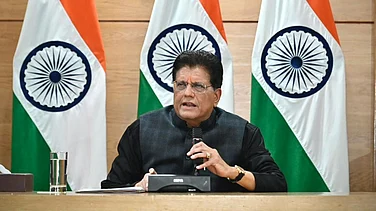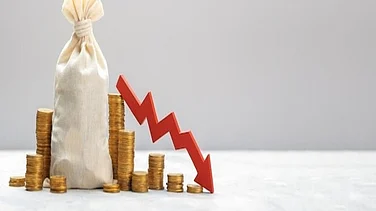Domestic air passenger traffic grew 15 per cent year-on-year to around 129 lakh in December 2022 but remained 1 per cent lower than the pre-pandemic level (December 2019), rating agency ICRA said on Thursday.
ICRA has also maintained a 'Negative' outlook on the Indian aviation industry.
In the April-December period of the current fiscal, domestic passenger traffic is estimated at around 986 lakh, registering around 63 per cent year-on-year growth and lower by approximately 9 per cent compared to April-December 2019 (pre-COVID levels), it said.
At the same time, the airlines deployed slightly higher capacity (less than 1 per cent) in the previous month over the year-ago period, the rating agency said, adding that it, however, was lower by around 7 per cent than the pre-COVID levels.
According to ICRA, the domestic aviation industry operated at an estimated passenger load factor of around 91 per cent in December 2022 against approximately 80 per cent in December 2021 and about 88 per cent in December 2019.
The agency said it expects a fast-paced recovery in domestic passenger traffic in FY2023, aided by normalcy in operations. However, the earnings recovery for domestic airlines is likely to be decelerated due to sharp escalations in aviation turbine fuel (ATF) prices and depreciation of the rupee against the US Dollar in the backdrop of increased competition.
"FY2023 is witnessing a quick recovery in domestic passenger traffic, aided by normalcy in operations and the waning impact of the pandemic," ICRA vice president Suprio Banerjee said.
While a meaningful improvement in passenger traffic is expected in FY2023, the pace of recovery in the industry earnings will be sluggish, and the industry is expected to incur a net loss of around Rs 150-170 billion owing to elevated costs, the report said.
However, this will be notably lower compared to the Rs 235 billion net loss in FY2022, primarily driven by a recovery in passenger traffic and lower interest burden, following the significant reduction in Air India Limited's debt before the divestment by the central government, it stated.
In the near term, the credit profile of Indian carriers will remain stressed until they are able to reduce their debt burden through a combination of improvement in operating performance and/or by way of equity infusion, it said.
A steady rise in jet fuel prices and a general inflationary environment continue to dampen the industry earnings, Banerjee said.
While airlines have been increasing yields, in ICRA's view, the same has not been adequate to offset the impact of the rising aviation turbine fuel prices, as per the report.
Noting that the outlook reflects ICRA's view that the financial performance of Indian airlines is likely to remain under pressure in the near term even as recovery in domestic passenger traffic has been healthy, it said the elevated ATF prices will continue to pose a major threat to earnings and the liquidity profile of the airlines in the near-to-medium-term.
Also, the depreciation of the rupee against the US Dollar (which adversely impacts lease rentals, maintenance costs and other overheads) will have a major bearing on the airlines' cost structure.
According to the rating agency, the airlines' efforts to maintain and/or grow their market share will limit their ability to expand margins in an elevated fuel cost environment.
The surge in airfares, driven by strong cost headwinds and supply disruptions for spares, is likely to impact capacity deployment. The airlines have been steadily raising airfares, however, the same has not been adequate to offset the impact of the sharp rise in ATF prices.
_1642183218.jpg?w=801&auto=format%2Ccompress&fit=max&format=webp&dpr=1.0)
Domestic Air Passenger Traffic Grows 15%
Domestic Air Passenger Traffic Grows 15%
Published At:
- Previous Story
 India–US Trade Deal to Be Formalised by Mid-March; Joint Statement Within Days: Piyush Goyal
India–US Trade Deal to Be Formalised by Mid-March; Joint Statement Within Days: Piyush Goyal - Next Story
MOST POPULAR
WATCH
MORE FROM THE AUTHOR
×


















.jpg?w=200&auto=format%2Ccompress&fit=max)




